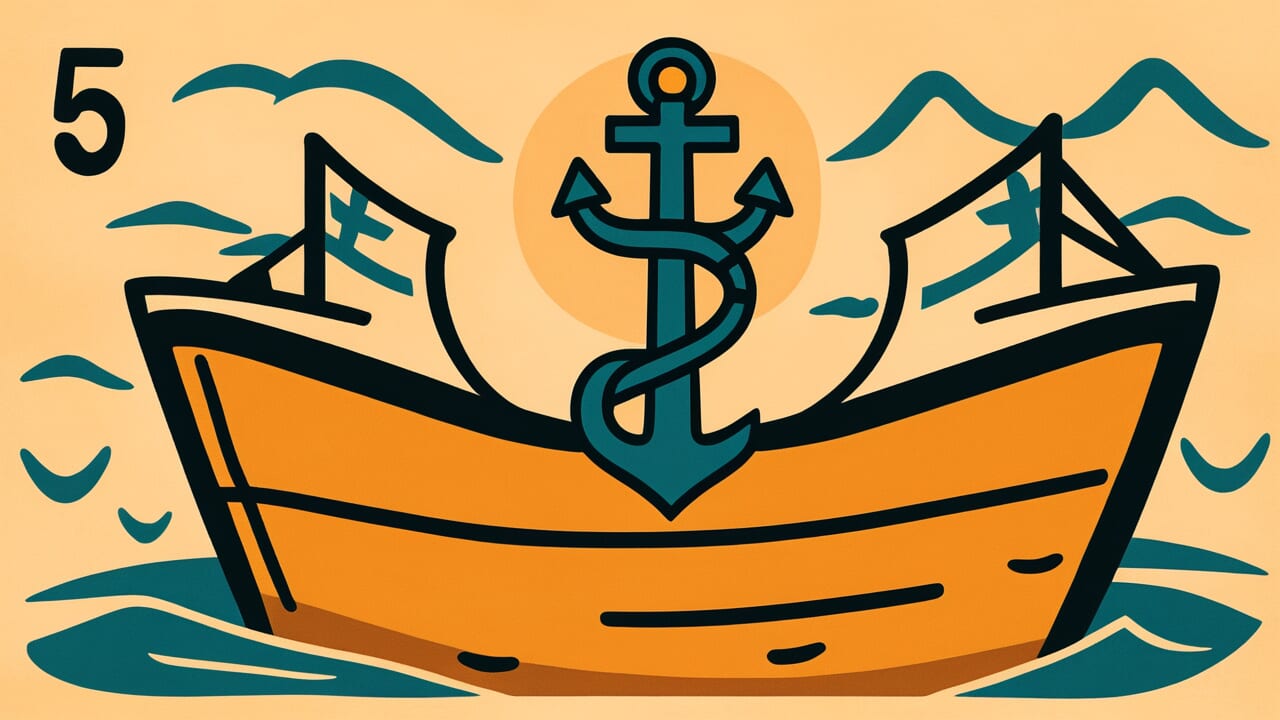How to Read “A Tosa ship’s anchor”
Tosabune no ikari
Meaning of “A Tosa ship’s anchor”
“A Tosa ship’s anchor” is a proverb that describes rough and crude behavior or character. It is especially used to describe people from the Tosa region who have fierce temperaments, lack restraint, and act impulsively.
This proverb is used when someone’s behavior seems rough and unrefined. It points out actions that lack manners, direct speech without consideration, or violent attitudes.
The expression emphasizes that even an anchor, a tool meant to stabilize a ship, is rough. This shows that the nature of the land and its people is fundamentally coarse.
Today, expressions that judge people’s character based on their region are generally avoided. However, this proverb is understood as a historical expression tied to the specific region of Tosa.
It is often used in contexts that view roughness and crudeness critically.
Origin and Etymology
The origin of this proverb has no clear written records. However, it is believed to have emerged from the regional character of Tosa (present-day Kochi Prefecture) and its maritime culture.
Tosa has long been a key maritime hub facing the Pacific Ocean. A culture of sailors battling rough waves took root there.
The waters off Tosa are known as rough seas where the Kuroshio Current flows. Ships navigating these waters needed sturdy and heavy anchors.
These anchors were said to be much larger, heavier, and more roughly made than those of ships from other regions.
The people of Tosa have long had a reputation for fierce temperaments, frankness, and lack of restraint. The energy and sometimes extreme directness of Tosa-born patriots like Sakamoto Ryoma are well known in history.
The roughness of Tosa ship anchors and the coarse character of Tosa people became overlapped. This is how the proverb was born.
The expression that even an anchor, a tool for ship stability, is rough came to symbolize the spirit of the entire region. It is an interesting expression that compares regional characteristics to maritime tools.
Usage Examples
- That person’s behavior is like a Tosa ship’s anchor, and people around them are confused
- It was such rough treatment that being called a Tosa ship’s anchor is unavoidable
Universal Wisdom
The proverb “A Tosa ship’s anchor” shows a universal truth. Human temperament and culture are deeply connected to the natural environment of a region.
The fierce temperament nurtured in a maritime culture battling rough waves was not just a flaw. It was also strength needed to survive a harsh environment.
This proverb has been passed down for generations because of complex feelings about human diversity. When we encounter temperaments and cultures different from our own, we feel confused and sometimes critical.
But we also know that these differences create the richness of human society. Qualities judged as rough can also be seen as frankness, honesty, and fearless courage.
Humans are beings who adapt to their environment. Gentle temperaments develop in peaceful lands, while tough spirits are nurtured in harsh nature.
This proverb, while critical, also acknowledges human adaptability and diversity. It recognizes the necessity behind different cultures and temperaments.
Our ancestors did not simply reject different cultures and temperaments. They understood the inevitability behind them.
While using irony, they accepted the Tosa people’s temperament as one kind of individuality. This teaches us the difficulty and importance of accepting diversity.
When AI Hears This
The phenomenon of a large Tosa ship running wild while dragging its anchor can be explained by the kinetic energy formula. Kinetic energy is calculated as “mass × velocity squared ÷ 2.”
If mass doubles, destructive power also doubles. But if velocity doubles, destructive power quadruples.
Once a heavy ship starts moving, stopping it requires the same amount of energy as starting it.
What’s interesting here is the property shown by the law of inertia: “the greater the mass, the harder to change its state.” A small boat can be turned by human power.
But once a large ship sets its course, correcting it requires enormous force. This is because the force needed to achieve the same acceleration increases with mass, according to F=ma.
For example, stopping a 10-ton ship requires 10 times the braking force of a 1-ton ship.
Even more noteworthy is the perspective of energy conservation. The kinetic energy of a moving ship doesn’t disappear. It disperses into the surroundings, converted into friction heat and wave energy.
When an anchor drags along the seabed, its destructive force changes the seafloor terrain. It stirs up sand and rocks and even affects the ecosystem.
This proverb embodies the cold reality of physical law: the energy held by a massive object must destroy something before it stops.
Lessons for Today
This proverb teaches us the importance of multiple perspectives when understanding differences in people’s temperaments and cultures. Behind surface-level roughness and crudeness lies the history that person or land has walked.
There is wisdom adapted to the environment.
In modern society, we have more opportunities to work with people from diverse backgrounds. At such times, don’t evaluate others only by your own standards.
Try to imagine the background from which their actions and attitudes emerged. Behavior you find hard to understand may be a rational choice within that person’s culture and experience.
At the same time, this proverb gives us a chance to reflect on ourselves. Your own temperament and behavior patterns are also influenced by the environment and culture you grew up in.
By becoming aware of this, you can interact with others more flexibly.
The attitude of recognizing differences and trying to understand them is the first step to building rich human relationships. Both roughness and gentleness are valuable characteristics.



Comments